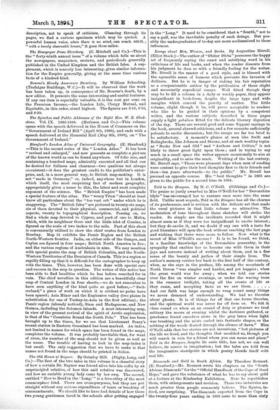Told in the Dimpses. By H. C. O'Neill. (Gibbings and
Co.)— The praise so justly awarded to Miss O'Neill for her "Devonshire Idyls" has encouraged her to venture once more into the same field. Unlike most sequels, Told in the Dimpses has all the charms of its predecessor, and is written with the delicate art that made the rural pictures in that little volume so attractive. The moderation of tone throughout these sketches will strike the reader. So simple are the incidents recorded that it might almost seem as if they were too insignificant to excite interest but they do excite it, and we doubt if any one with a taste for good literature will open the book without reaching the last page and wishing that there were more to follow. Now what is the secret of Miss O'Neill's success ? It is to be found, we think, in a familiar knowledge of the Devonshire peasantry, in the sympathy that enables her to become one with them in their joys and sorrows instead of writing about them, and in a fine sense of the beauty and pathos of their simple lives. The author's memory carries her back to the first half of the century, when, as she says in the preface, life among the moorlands of North Devon "was simpler and harder, and yet happier; when the great world was far away ; when we told our stories over the fire on winter evenings, or under the waving trees in the summer twilight, taking all the events of life as
they came, and accepting facts as we saw them And our faith was large enough to wrap round many things we never dreamed of understanding. We had no theories about ghosts. It is of things far off that one forms theories, and the spiritual world was never far off from us. We felt it dose round us when on an errand of duty or pleasure we trod solitary the moors at evening whilst the darkness gathered, or perchance found ourselves alone in the grey lanes when light was breaking and the mists curled into fantastic shapes, or the sobbing of the woods floated through the silence of dawn." Miss O'Neill adds that her stories are not inventions, "but pictures of
the life we lived, and the thoughts that moulded us, though you will search in vain for a friend whom you can name and place." Told in the Dimpses, despite its eerie title, has not, we can well believe, its source in imagination ; but the tales are told from the imaginative standpoint in which poetry blends itself with real life.






































 Previous page
Previous page